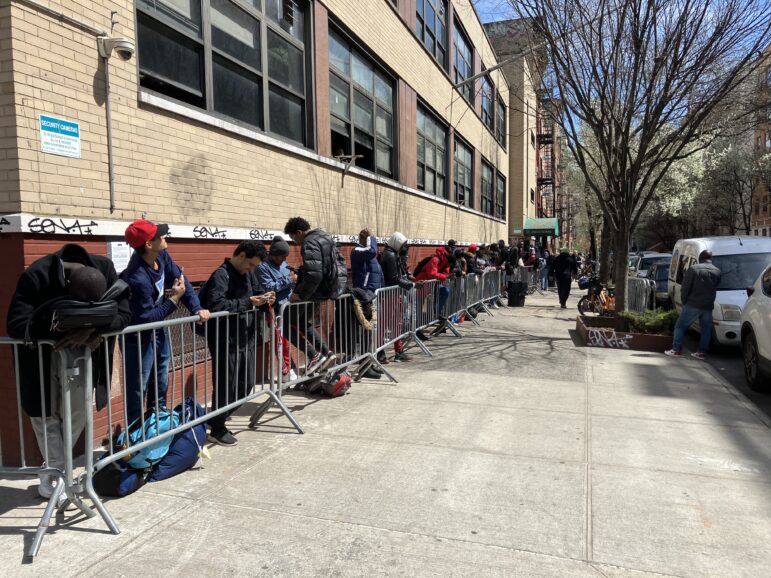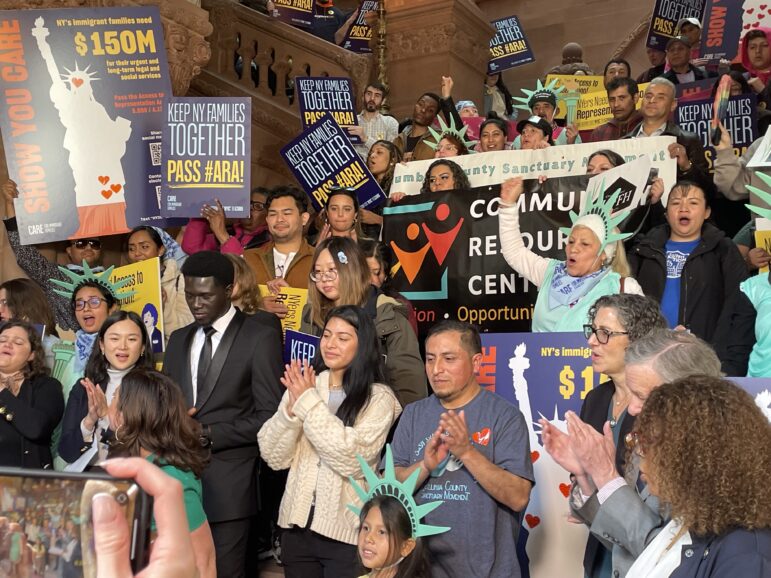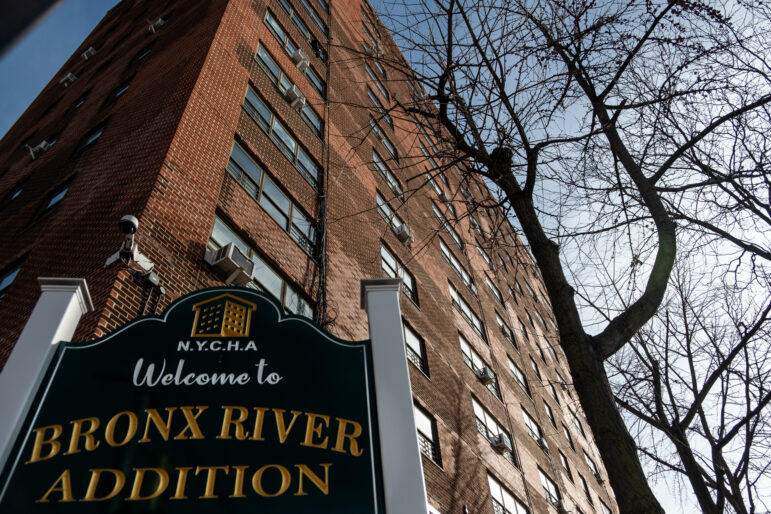
Photo by: Jim Henderson
Community groups and retail workers’ unions squared off in 2009 against the Bloomberg administration, a developer and trade workers over whether to impose living wage requirements for stores that would open in a renovated Kingsborough Armory. Now the same players are battling over a proposal to apply living wage rules to all city-subsidized developments.
The battle lines are all too familiar: A worker-rights bill backed by a broad coalition of unions and progressive politicians, but opposed by major business interests. A majority of the City Council on board as sponsors, but no commitment from the Council speaker. Dueling economic impact studies conducted by the two opposing sides, with each insisting that the other’s is inadequate.
After the Council’s long-awaited bill to extend sick leave to all private employees in New York City crashed and burned last fall once Council Speaker Christine Quinn declared that it would be too harmful to businesses during tough economic times, many of the same players turned their sights on a proposed “living wage” bill for recipients of city development subsidies. Under a bill signed by Mayor Bloomberg in 2002, city contractors are already guaranteed pay of of $10 an hour; the new legislation would guarantee above-minimum wages—$10 an hour for workers with health benefits, $11.50 an hour for those without—to all employees of companies that receive public subsidies from the city Economic Development Corporation or Industrial Development Agency, including commercial tenants at city-funded development projects like malls.
The proposal has drawn bitter opposition from both business groups and the Bloomberg Administration, which say it would put certain stores at a competitive disadvantage. Proponents counter that providing higher wages is a fair tradeoff for city subsidies—and that other cities have pulled off the trick without discouraging development.
Roots in Armory battle
The Fair Wage for New Yorkers Act was introduced last spring by Bronx councilmembers Oliver Koppell and Annabel Palma, in the wake of the bruising fight over redevelopment of the Kingsbridge Armory, where developer The Related Companies wanted to build a mall. That project ultimately foundered when Related pulled out after the Council—at the behest of Bronx supermarket unions, community groups, and Bronx Borough President Ruben Diaz Jr., and over the opposition of Mayor Bloomberg—required that any jobs at the mall would have to pay wages well above the minimum.
Koppell legislative director Jamin Sewell says the armory battle was “the last straw” after previous attempts to negotiate community benefits with the Yankees for their new stadium, and with Related for the Gateway Center mall project. “We’ve gone from megaproject to megaproject trying to negotiate decent community benefits agreements,” he says, but with limited success, as the council’s powers are limited to land use oversight. A living wage law would not only eliminate the need for case-by-case battles, he says, but would be a fair exchange for EDC and IDA subsidies: “I think the feeling is that if you’re receiving huge subsidies, then you have to give back to the community.”
The Retail, Wholesale and Department Store Union played a key role in the Kingsbridge battle in support of unionized Bronx supermarkets who worried that low-wage stores at a subsidized armory mall would undercut their business. As the fight over the new living wage law has taken shape, RDWSU and other proponents of the legislation have worked to build a broad coalition of support for the new legislation, including a “faith caucus” of clergy from throughout the five boroughs.
“I think people just don’t realize the level of pressure that low wages put on families at every level,” says Rev. Doug Cunningham of New Day United Methodist Church in the northwest Bronx, who first became active in the living-wage fight around the Kingsbridge Armory. “We have lots of families here in the Bronx working two or three jobs. So then you’ve got kids on the streets at night instead of doing their homework. You’ve got kids not ready for school the next morning.”
Business leaders–particularly the Real Estate Board of New York, the lobbying arm of the city real estate industry, and the Partnership for New York City, which spearheaded opposition to paid sick leave–retort that while increased wages would be nice, they’d make development projects unaffordable. REBNY president Steven Spinola wrote last summer that the Koppell-Palma bill would “greatly impede job creation and even halt it entirely,” because it would be impossible to find tenants who’d agree to rent space when they could “go across the street to comparable space and not be required to pay the higher mandated wage.” (Neither the city Economic Development Corporation, the Real Estate Board, nor the Partnership responded to repeated requests for comment for this story.)
The 5 Boro Chamber Alliance, a coalition of borough chambers of commerce that was active in opposing paid sick leave, has likewise come out against the Koppell-Palma bill. “The living wage bill just drives me crazy, says Queens Chamber of Commerce executive vice president Jack Friedman, who calls it “another example of government telling businesses how how to do their business, and not understanding the pressures that businesses are under.” He says he’s baffled that those who supported a living-wage rule at the Kingsbridge Armory project “somehow think it’s a victory that 2,000 people who could be working now aren’t. I just don’t understand the logic.”
Unlike increases in the minimum wage, says Friedman, a living-wage policy tied to subsidies creates an un-level playing field: “Who the heck is going to move into a mall, whether it’s Kingsbridge or Queens Center or anywhere else, if you’re telling that retailer you must pay your employees 50 percent more than the guy down the street?”
Debate over economic impact
A partial answer, say living wage advocates, can be found in the 15 or so cities that have living-wage laws for developer subsidies already on the books. Paul Sonn, an attorney at the National Employment Law Project who’s helped local governments write living wage laws, notes that both Los Angeles and San Francisco have been successful at crafting laws that raise wages without discouraging development. “I think the record in Los Angeles and other cities has been that it hasn’t been an obstacle to doing deals,” he says. One result, he says, has been that developers have worked harder to lure high-end hotels or “retailers like Costco that already pay better wages.”
According to Cecilia Estolano, who ran the Los Angeles Community Redevelopment Agency for three and a half years before leaving last November, “certainly the living wage ordinance that Los Angeles passed back in the early ’90s didn’t create any backlash—we didn’t have any fewer contractors as a result of that. It’s just something they adjust to as a cost of doing business.” The key, she says, was to implement it in a way to reach out to developers and in a way that makes them part of the process.
In fact, Estolano says, a blanket policy can be preferable for developers to having to negotiate everything on a case-by-case basis. “The thing you always hear from developers—and I used to represent developers, I was a land use lawyers for a number of years—is they want certainty,” she says. “The nice thing about having a policy is you know exactly what you’re getting. It’s not an ad hoc negotiation that can shift and change depending on political winds. You can price your product accordingly. And I think that does make a blanket policy preferable.”
It’s an argument that Friedman agrees with–up to a point. “I’d love to pay everybody a minimum of $11.50,” he says. “You want to raise the minimum wage for everybody and keep that field balanced? Great—you’ll lose millions of jobs nationwide, you’ll lose hundreds of thousands of jobs citywide, you’ll be hurting the people you purport to want to help, but at at least you’ll have a level playing field.”
The debate over how wage laws affect economic activity is, of course, a long-running one: In general, conservatives and business groups oppose them as job-killers, while liberals and unions tout the economic benefits of putting more spending money into the hands of low-wage workers. On the subject of living wage laws in particular, proponents point to a study released last year by the DC-based Center for American Progress that compared employment growth in 15 cities that had implemented living wage laws for recipients of subsidies, and found they “had the same levels of employment growth overall as a comparable group of control cities.”
Last August, the EDC announced that it would be spending $1 million to conduct its own economic impact study, this one conducted by Boston-based Charles River Associates. Backers of the legislation immediately cried foul, with NELP and the Fiscal Policy Institute issuing a statement noting that lead researcher David Neumark has been a lifelong opponent of minimum-wage and living-wage laws; comptroller John Liu decried the EDC’s research contract as a “million-dollar sham.”
Modest reach … at first
Koppell staffers say they hope to hold a Council vote on the living wage bill once the EDC report is complete. Though the legislation currently has 29 sponsors, five short of the two-thirds majority needed to override a certain mayoral veto, Koppell’s office says it hopes more members to sign on once a revised bill is introduced that would exclude businesses with less than $1 million in annual sales, non-profits and affordable housing from the law’s mandates.
The key wild card in this case is Speaker Quinn, who, as she did with the sick leave bill, has steadfastly avoided taking a position. There’s some speculation that because the living wage bill would affect a far narrower range of businesses than the sick leave bill, Quinn would be more likely to give her backing.
If the bill does successfully run the Council gauntlet and become law, even its backers admit that its effects would be limited: All existing EDC projects combined only amount to 4 percent of the city’s private workforce, or about 150,000 people, and projects already completed would not be subject to the new law. Still, notes Sonn, it would set a standard that could later be extended to other major development projects; in Los Angeles, the city eventually expanded its living-wage requirement to hotels near L.A. International airport that received infrastructure benefits from the city.
This is exactly what worries business leaders such as Friedman. “It will have a much much smaller effect on retailers,” he agrees. “It’s not going to affect a law office the same way that paid sick leave would.” Still, he says, it’s important for small business owners to stand together, because “the next one could be you.”








